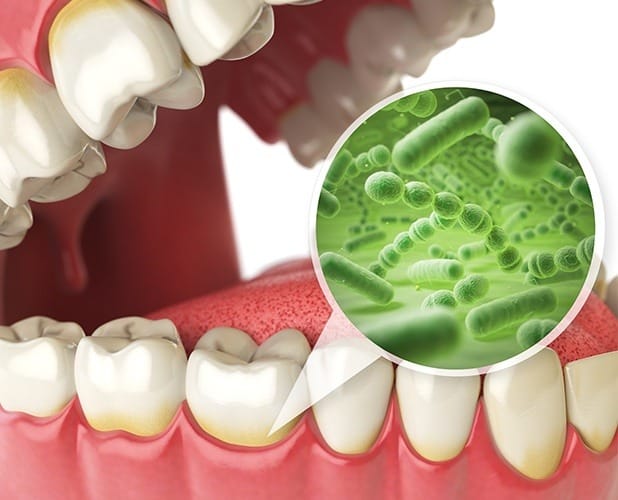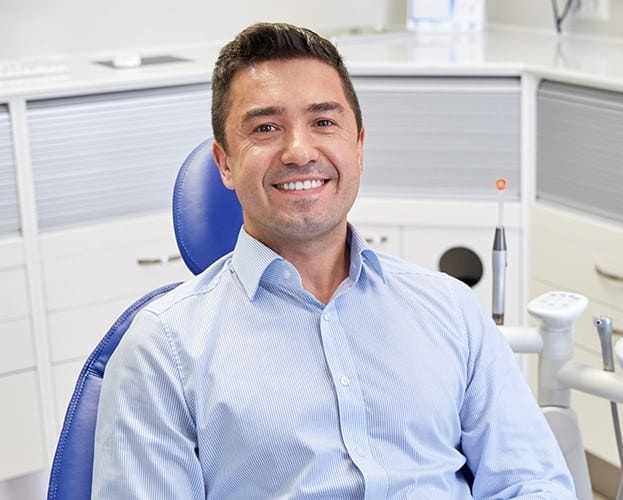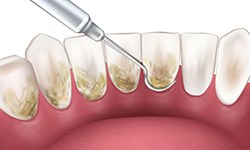Periodontal Disease Treatment – Leesburg, VA
Soothe
Sensitive Gums
Despite all the attention that cavities receive, periodontal disease (also called gum disease) is actually the most common dental problem in the US and the world. According to the CDC, approximately 50% of the US adult population currently has a mild form of it. If you notice sensitive, swollen, or bleeding gums, be sure to visit All Smiles Leesburg right away. Our periodontal disease treatments in Leesburg, VA can get your oral and overall health back on track right away while also improving your daily comfort.
Why Choose All Smiles Leesburg for Periodontal Disease Treatment?
-
Technologically
Advanced Dental Office -
Kind, Compassionate,
& Skilled Dental Team - Relaxed Environment & Low-Pressure Atmosphere
What is Gum Disease?

As we eat and drink throughout the day, a bacterial film called plaque forms on the surface of the teeth. Regular brushing and flossing ensure that plaque is removed from the surface of the teeth and gums.
If proper hygiene is not practiced and the plaque is allowed to remain on the surface of the teeth, a rock-hard bacterial substance known as tartar is formed. Tartar cannot simply be removed with brushing or flossing; it must be professionally removed with dental tools.
If left unattended, the bacteria begin to multiply and cause damage to the teeth and gums. Over time, the patient faces the risk of:
- Loose teeth
- Tooth loss
- Bad breath (halitosis)
- Pain, swelling, and bleeding in gums
- Increased risk of heart disease and heart attack
- Increased risk of stroke
- Increased risk of diabetes
What To Expect During Periodontal Treatment

To begin your periodontal treatment, your dentist or hygienist will first ensure that you are completely numbed with local anesthesia to minimize discomfort, as parts of the cleaning will be conducted beneath the gum line. It is imperative that you are comfortable throughout the procedure.
All signs of plaque and tartar will then be removed from both above and below the gumline. Depending on the progression of your condition, antibiotics may be placed beneath your gums to discourage bacterial growth, and the status of your condition will be checked and noted. You will then typically be asked to return in about three months for your next checkup and periodontal cleaning.
Scaling & Root Planing

This type of periodontal treatment is a special “deep” cleaning that is used to successfully manage gum disease. While moderate to severe gum disease cannot be reversed, it can be prevented from worsening. Undergoing periodontal treatment as recommended by your dental professional can help preserve the overall health of your teeth and gums. Here’s what you can expect from scaling and root planing.
Do I Need Scaling & Root Planing?

This procedure is typically reserved for those who are struggling with mild to moderate periodontal disease. Our team will assess your oral health and gums to verify if scaling and root planing will be necessary. In many cases, however, some of the biggest indications for needing this treatment include:
- Red gum line
- Swollen or inflamed gums
- Receding gum line
- Gums that easily bleed after brushing or flossing
- Noticeable plaque buildup along the gum line
- Chronic bad breath (halitosis)
The Process of Scaling & Root Planing

Scaling and root planing typically take a couple of appointments to complete, as you will need to allow your gums to heal between visits. Firstly, you’ll undergo an initial consultation where our team will evaluate your situation and walk you through the process as well as the cost of your treatment. If you’re eligible for the procedure, we can begin the scaling portion, which involves removing the plaque and bacteria from the base of your teeth and underneath the gum line. We will especially want to treat the bottom of pockets that may have developed between your gums and teeth.
Our team will send you home so that your gums can heal. Afterward, you’ll return for the root planing portion, which will consist of smoothing out the surface of the tooth roots. This will allow your gums to attach to your teeth more easily while also making it more difficult for bacteria to settle over time. This can effectively prevent future infection as well as improve the gum’s ability to heal.
Aftercare Tips for Scaling & Root Planing

While the entire treatment might be straightforward, it can take a few weeks to complete. After your visits, it is normal to experience some mild discomfort and sensitivity around your teeth and gums. To minimize these symptoms and make your recovery as smooth as possible, try keeping the following tips in mind:
- Rinse your mouth with warm salt water every day to alleviate swelling and fight bacteria
- Brush and floss your teeth and gums gently (use a soft bristle toothbrush)
- Avoid alcohol, tobacco products, and hot/spicy/acidic foods and drinks
- Refrain from excessive physical activity for at least several days
- Stick to a soft food diet for the first 48 hours following your appointment
